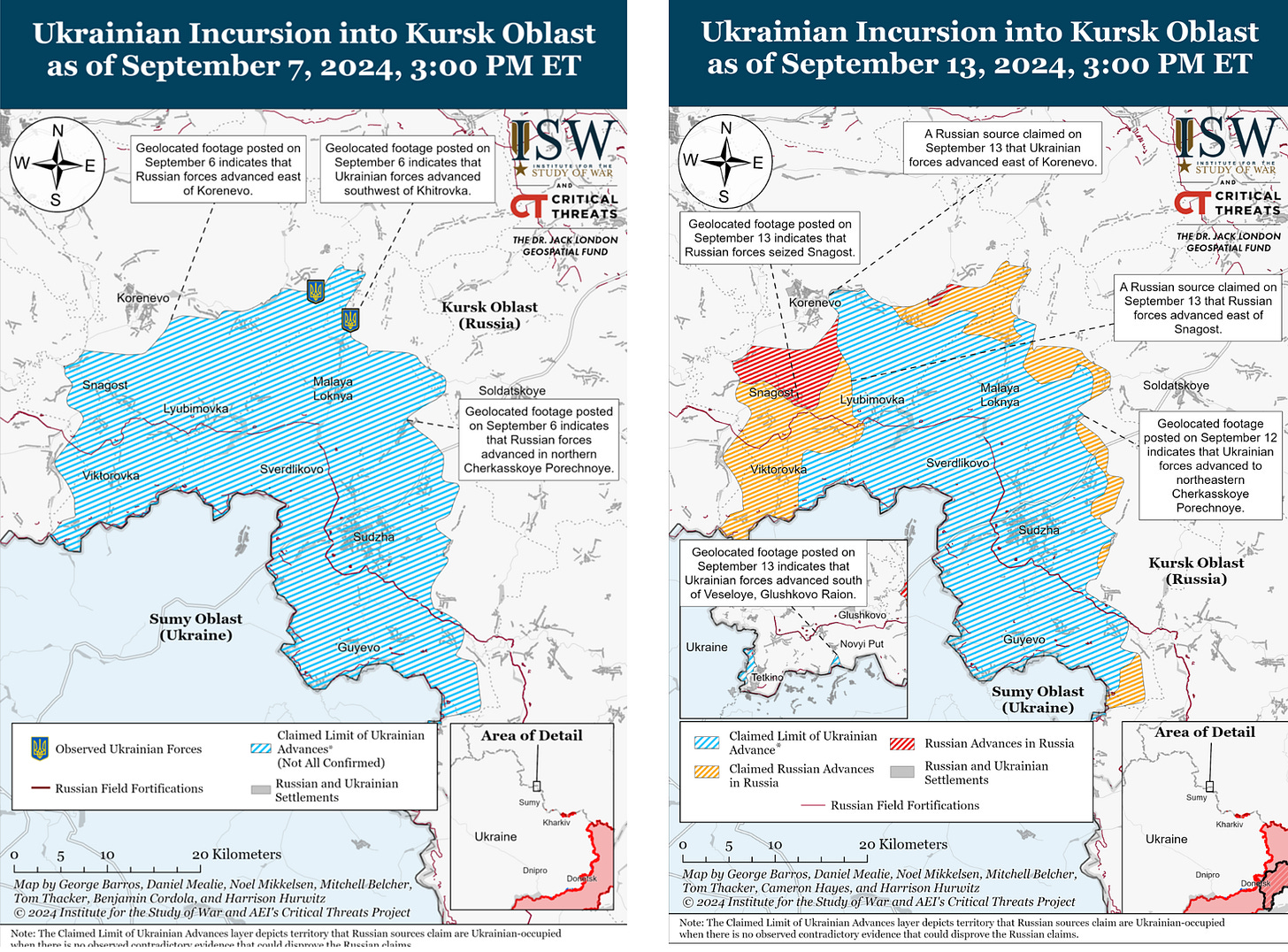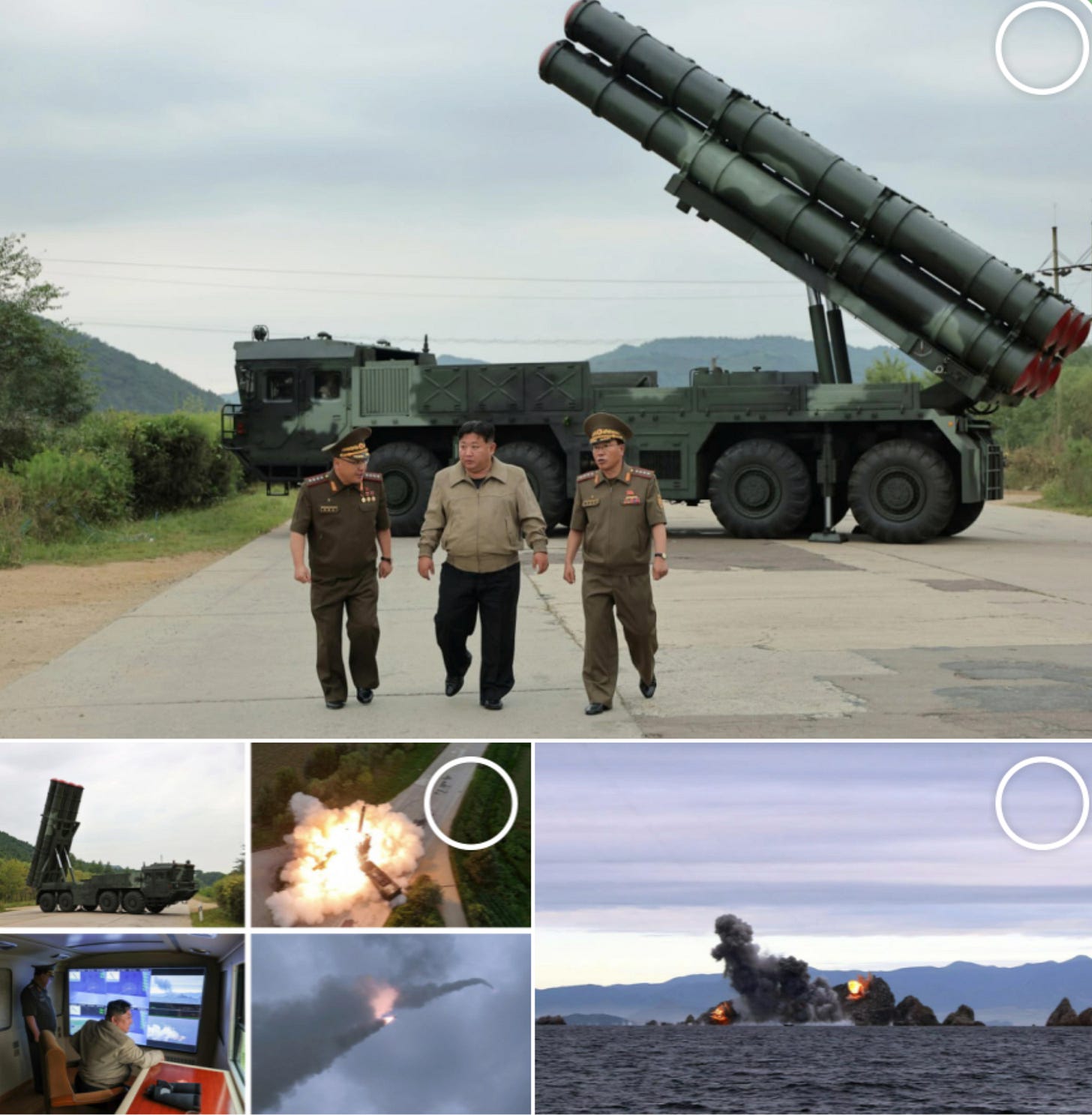TWTW: The World This Week #108
The campaign: Debate's over, not global angst…Germany: immigrants no more? Ukraine (& NKorea): all 'bout the missiles…Poland's idea for Trump…Taiwan cartoonist Stellina has her own look at US schools
In this weekly feature for Andelman Unleashed, we continue to explore how the media of other nations are reporting and commenting on the United States, and how they are viewing the rest of the world.
Now, with newly paid tiers, you can help fund our mission of plumbing ever more media around the globe & supporting their great journaIism.
How others see America
Still riveted ….
The Debate's over, but the world has hardly lost interest. Now the question is just how Kamala Harris can pull off a win over the Donald Trump she defeated on this past week's contest. The Peter Burghjardt, Washington correspondent for the Munich-based daily Süddeutsche Zeitung believes "the contest is now for the undecideds"….
The presidential election in the USA will be decided in the swing states. The Republican is relying on his entourage and classic issues such as migration. The Democrat is trying to score points in a completely different way.
What a crazy election year in the USA - and the finale is still to come…Almost 60 million television viewers saw a former prosecutor corner a convicted criminal….
But it's about the undecided in between. This fickle part of the electorate of ten or 15 percent decides the election, and common sense could be an advantage here. The decision is made in the contested states, around seven out of 50. It is not the nationwide number of votes that determines who gets to move into the White House, the popular vote. It is the number of electoral votes, the electoral vote…
Roughly speaking, the USA is red in the middle, which is the color of the Republicans, and blue on the coasts, which is the color of the Democrats. Accordingly, there is a struggle for the swing states, in which sometimes one prevails and sometimes the other….
Trump is currently taking his anger and egocentrism to Las Vegas, Flint in Michigan and New York. He is relying on his classics: immigration (hence his legend of strangers devouring dogs, cats and ducks) and inflation (which has been falling for months). He is also trusting his instincts, which are increasingly driving his advisers to despair. He is now supported by Robert F. Kennedy Jr., a friend of strange theories….
Kamala Harris is currently touring North Carolina and Pennsylvania, and she has some catching up to do in the provinces in particular. The Democrat wants to score points with her commitment to abortion rights, among other things, and she is increasingly confident in painting the big picture. She is the smiling face of the future and Trump is the dangerous loser of yesterday.
12 hours later, Burghjardt gave his readers across Germany his "opinion":
Now would be the moment for Republicans to put the good of the country above their own party…
If the Republicans want to remain a state-supporting party, they must fear a Trump victory almost more than his defeat.
In Paris, readers of Le Figaro, Frances leading center-right daily, found its p.1 editorial from Philippe Gélie suggesting:
The hardest part remains to be done
It’s not easy to face the Horseman of the Apocalypse, who announces nuclear war and the disappearance of America if he is not given full powers. Kamala Harris nevertheless survived the test, facing a Donald Trump who is darker than ever. In the Republican’s universe, immigrants eat pets and Democrats kill babies after birth….Accused of the ten plagues of Egypt, her rival nevertheless focused on talking to Americans about themselves, a striking contrast with the egotist in chief….
Will this heated debate be enough to shake up the campaign, as Joe Biden's rout did last June? It is doubtful. Shooting their arrows from alternative realities, neither candidate has defeated the other.
But the hardest part remains to be done. Driven by a wave of enthusiasm—and media support—Kamala Harris is now stagnating in the polls and struggling to make a difference….
Even if she has swapped the electoral marathon for a sprint, the last few meters are shaping up to be the most difficult for the Democratic champion.
And then there's Jordanian cartoonist Emad Hajjaj's take on the debate for France24 television….
Special for the Paid !
Andelman Unleashed has unleashed new, paid tiers. Now on
Thursday evenings, for our (lightly) paid subscribers, we'll be offering our Unleashed Conversation via Zoom….
6 pm in New York & Washington / 3 pm on the US West Coast
Midnight in Paris and most of Europe
7 am Friday in Tokyo / 8 am Friday in Sydney & Melbourne
It's a special perk for our paid subscribers, along with our closing cartoon each week from Cartooning for Peace, and other special features … so do sign up… cheaper than a monthly mocha grande.
This will also help us subscribe to more (expensive!) media across the globe and support great journalism in multiple languages.
How others see the World
Germany: a tip for Kamala? Immigrants no more?
Since the stunning victory in state elections this month of Germany's far-right AfD [Alternative für Deutschland] party—chronicled by Andelman Unleashed—on a platform with a centerpiece of banning new immigrants, suddenly for the national ruling, moderate coalition, how to cope has taken center stage. The solution appears to run up hard against one of the very foundations of the European Union—a continent without a single internal border or passport control. Enter in Bulgaria, you can travel to Paris or Brussels or Amsterdam, crossing a dozen frontiers and never show your passport. But now, not through Germany. As DW [Deutsche Welle] explained:
German Interior Minister Nancy Faeser on Monday announced an extension of passport controls along all of the country's land borders. The controls, aimed at curbing the number of people entering Germany without visas, come amid a growing debate about limiting irregular migration.
"We are doing everything we can to protect the people in our country against this," said Faeser. " Long-standing debate over immigration and the asylum system in Germany has intensified in recent weeks after a deadly knife attack in the western German city of Solingen earlier this month. The suspected attacker, a Syrian citizen, had escaped deportation from Germany to Bulgaria, where he first entered the EU.
Germany shares more than 3,700 kilometers (more than 2,300 miles) of land borders with Denmark, the Netherlands, Belgium, Luxembourg, France, Switzerland, Austria, the Czech Republic and Poland. All are fellow members of the Schengen Zone, within which there are usually no restrictions and checks on travel.
Germany's coalition government has been consulting with the main conservative opposition CDU and CSU parties on ways to curb migration in the face of public concern. The far-right anti-immigration Alternative for Germany (AfD) party won state elections in the state of Thuringia last week and came second in another state, Saxony.
Faeser's Social Democrats are facing a state election in Brandenburg in two weeks, where her party—which is also that of Chancellor Olaf Scholz—governs in coalition with the Greens and Christian Democrats.
Ukraine—It's all about the missiles?
Not exactly. In fact, a lot has to do with the whole progress of the war. As these maps from the Institute for the Study of War [ISW] suggest, in the past week there have been small, yet perhaps tangible changes, with Russians claiming some advances on Ukraine forces that invaded earlier this year.
What might help Ukraine is the use of long-range missiles. Take off the handcuffs. Le Monde notes that, still, "France cultivates ambiguity over deep strikes in Russia," as Chloé Hoorman and Philippe Ricard report:
No official position and great discretion on the part of the Elysée and the resigning ministers. While the United Kingdom is at the forefront in trying to convince the United States to authorize Ukraine to strike military sites located in Russia, France cultivates ambiguity on the issue. Friday, while Joe Biden refused to accede to this request, the French authorities, very much in the background in this discussion against a backdrop of political turbulence in Paris, refrained from making the slightest comment.
The concern is to avoid a new escalation with Moscow, which is multiplying its threats. Such a decision "would mean that the NATO countries, the United States and the European countries are at war with Russia ," Vladimir Putin argued on Thursday. "We must do everything to avoid a third world war," said a French diplomatic source. "You cannot just dismiss the hypothesis that the Russians are extending the domain of war."
Still, Britain wants to press ahead, but apparently with deliberation, which London's The Telegraph suggests is not universally admired in Britain:
Grant Shapps has accused Sir Keir Starmer of “playing into Putin’s hands” by delaying an announcement on whether Ukraine can fire British-made missiles into Russia.
The former defence secretary said the Prime Minister should give the green light now, rather than waiting for US approval.
Sir Ben Wallace, another former defence secretary, said the “tug of war” over the use of the missiles would embolden Vladimir Putin.
What might help Ukraine is the use of long-range missiles. Take off the handcuffs. Le Monde notes that, still, "France cultivates ambiguity over deep strikes in Russia," as Chloé Hoorman and Philippe Ricard report:
No official position and great discretion on the part of the Elysée and the resigning ministers. While the United Kingdom is at the forefront in trying to convince the United States to authorize Ukraine to strike military sites located in Russia, France cultivates ambiguity on the issue. Friday, while Joe Biden refused to accede to this request, the French authorities, very much in the background in this discussion against a backdrop of political turbulence in Paris, refrained from making the slightest comment.
The concern is to avoid a new escalation with Moscow, which is multiplying its threats. Such a decision "would mean that the NATO countries, the United States and the European countries are at war with Russia ," Vladimir Putin argued on Thursday. "We must do everything to avoid a third world war," said a French diplomatic source. "You cannot just dismiss the hypothesis that the Russians are extending the domain of war."
Still, Britain wants to press ahead, but apparently with deliberation, which London's The Telegraph suggests is not universally embraced in Britain:
Grant Shapps has accused Sir Keir Starmer of “playing into Putin’s hands” by delaying an announcement on whether Ukraine can fire British-made missiles into Russia.
The former defence secretary said the Prime Minister should give the green light now, rather than waiting for US approval.
Sir Ben Wallace, another former defence secretary, said the “tug of war” over the use of the missiles would embolden Vladimir Putin.
And then there are the POWs….
ISW chronicles a big prisoner exchange, with the motives being most interesting—at least from the Russian side:
Ukraine and Russia conducted their second prisoner of war (POW) exchange since the Ukrainian incursion into Kursk Oblast on September 13. Ukrainian President Volodymyr Zelensky announced that Ukraine and Russia each returned 49 prisoners and the United Arab Emirates (UAE) mediated the swap. [A total that Zelensky tallied at 103.]
Zelensky stated that Ukraine returned servicemembers who defended the Azovstal Steel Plant in Mariupol, servicemembers of the Ukrainian National Police and State Border Service, and civilians. Russian officials have not yet confirmed the details of their returned prisoners, but Russian sources claimed that Russia returned individuals whom Ukrainian forces captured in the Kursk direction, including conscripts. Ukrainian officials have previously suggested that the Ukrainian incursion into Kursk Oblast has forced Russia to more readily consider POW exchanges. Russian opposition outlet Vazhnye Istorii reported that Russian citizens wrote a record number of 1,927 requests to Russian President Vladimir Putin to search for Russian servicemembers missing or captured in August 2024 following the beginning of the Ukrainian incursion into Kursk.
China on the fringes….
"EU torn over China, first test of 'economic foreign policy,'” write SubStack colleagues David Carretta and Christian Spillmann in their indispensable La Matinal Européenne:
Promoted by Emmanuel Macron, the concepts of European sovereignty and strategic autonomy are now present in all the speeches of EU leaders. In a world where others no longer respect the old rules of the game of liberal globalization, Europe must change to avoid being crushed by the United States and China.
Mario Draghi’s report on the future of European competitiveness presented on Monday has once again sounded the alarm. But in the first real test of the EU’s determination to meet this challenge—the imposition of anti-subsidy customs duties on electric vehicles imported from China proposed by the Commission—the twenty-seven member states are sending the opposite message: Europe is weak, divided and hesitant, focused on short-term national interests, ready to give in to the law of the strongest. Paradoxically, it is two progressive and pro-European leaders, German Chancellor Olaf Scholz and Spanish Prime Minister Pedro Sanchez, who are weakening the EU.
The time for a final decision on tariffs on Chinese electric vehicles is approaching. The vote by member states is expected to take place between the end of September and the beginning of October. But the leaders of Spain and Germany have publicly stated that they want a rollback on the tariffs. “We don’t need a new war, in this case a trade war,” said Spaniard Pedro Sanchez during a visit to China this week: “I have to be direct and frank..... I think we should all reconsider our position, not only the member states, but also the Commission.”
Germany immediately applauded Mr. Sanchez. “We share the same direction of travel,” explained Steffen Hebestreit, spokesman for Olaf Scholz.
Nearby, in North Korea
Kim Jong-un seems to be ramping up his nuclear weapons program and brandishing it as a broadening threat nearby and far away, as the leading South Korean daily Chosun Ilbo reported:
Kim Jong-un visited the Nuclear Weapons Institute and a production facility for weapons-grade nuclear material, inspecting a uranium enrichment plant and ordering significant advancements, the official Rodong Sinmun daily reported. Kim conducted an on-site inspection of the facility, reviewing the production of nuclear warheads and weapons-grade material. He outlined key tasks to increase production capacity.
During his visit to the uranium enrichment facility’s control room, Kim checked the operation of the production process, including centrifuges and various control systems developed by North Korean scientists. After receiving reports on the facility’s ongoing production, he expressed “great satisfaction,” Rodong Sinmun reported.
This is the first time North Korea has disclosed Kim’s visit to a uranium enrichment facility, along with related photos. Uranium enrichment facilities use centrifuges to rapidly spin uranium, producing highly enriched uranium for nuclear warheads. While touring the production site, Kim remarked that observing the facility “energizes” him and emphasized the need to further strengthen the foundation for producing weapons-grade nuclear material. He also inspected the construction site for expanding production capacity and reviewed the equipment assembly schedule.
Praising the technology in the nuclear sector as “truly remarkable,” Kim presented a new strategic direction for nuclear force development, urging scientists to implement the party’s decisions. He noted that nuclear threats from “the U.S. and its allies” have become more blatant and have crossed the red line, making it necessary to strengthen North Korea’s nuclear forces to address future threats from the U.S.
The Bulletin of the Atomic Scientists has reported that "North Korean may have produced enough fissile material to build between 45 and 55 nuclear weapons; however, it may have only assembled 20 to 30." Other estimates suggest that it may already have stockpiled an arsenal as large as 50 fully assembled.
Meanwhile, Telegram's Asianomics reported:
North Korea test-fired short-range missiles for the first time in 73 days in a sabre-rattling move seen to be aimed at the lead-up to the US presidential election and also test weapons that could potentially be deployed in the Ukrainian conflict.
Thursday's launch, which involved multiple ballistic missiles, came a week after Pyongyang warned that Seoul and Washington would pay a "dear price" for joint military exercises.
The missiles were launched near Pyongyang and traveled roughly 360 km east before landing in the Sea of Japan, according to South Korea's Joint Chiefs of Staff….
And then, an idea for Trump from Poland ?
Keep reading with a 7-day free trial
Subscribe to Andelman Unleashed to keep reading this post and get 7 days of free access to the full post archives.















